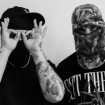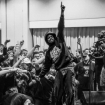Heavy metal has always reached into some surprising places, and hip-hop has often been there to meet it. Just as the Beastie Boys were originally a NYC hardcore band in early 1980s, the explosive, innovative rappers of Run the Jewels grew up with a mixture of Run-DMC and Metallica, of Public Enemy and the Melvins, feeding their ears with thundering turntables and loud guitars. It's a sound that still inspires the duo today.
Across three albums recorded so far as Run the Jewels, this raging collaboration between Atlanta MC Killer Mike and Brooklyn rapper/producer El-P has been fueled on intense sounds and scathing social commentary, with beats and riffs that rock hard. On the track "Close Your Eyes (And Count to Fuck)," RTJ are joined by a livid Zack de la Rocha of Rage Against the Machine to help describe a prison riot as El-P embraces the noise, describing himself as "a dirty boy who come down on the side of dissonance/I can't even relax without sirens off in the distances."
Both together and apart, Killer Mike and El-P have collaborated with a long list of legit hard rockers and metal masters, including Nine Inch Nails' Trent Reznor, Deftones frontman Chino Moreno and the Mars Volta. Travis Barker turns up behind the drums now and then, adding to RTJ's wild mix of good times and bad vibes, equal parts psychedelic and menacing, comic and tragic. The result can be as ominous as Sabbath, or as speedy and unstoppable as classic Slayer — not unlike Killer Mike's early hero Ice-T, who helped originate gangsta rap before taking his free-speech battle into heavy metal with his band Body Count.
Revolver caught up with Run the Jewels to talk about their heaviest musical inspirations and how those influences are reflected in the duo's creative output and philosophical outlook.
WHAT IS YOUR CONNECTION TO HEAVY METAL?
EL-P I just like heavy music in general — from heavy rock and heavy metal and heavy rap and heavy everything. I've always been attracted to it. To film scores. Anything that gets to the more emotional and dark side of music, I always enjoy. I also grew up on stuff like Gang of Four and Suicide and the Melvins, the Clash, as well as all the hip-hop music that I grew up on. EPMD was heavy. Public Enemy was heavy. Ice Cube was heavy. I've always personally gone toward that realm. The lighter, airy smooth stuff, while I could enjoy it to a degree, it was never sort of my personal preference. The stuff that got me moving was stuff that punched you in the gut a little bit.
KILLER MIKE I'm lucky to have grown up at a time when you could see Run-DMC and Metallica the same summer — whether it was Kill 'Em All in '83 and Run-DMC coming in '83, '84. The light and airy stuff was, like, what my mom was into, what my sisters were into. But I was into rage. Early rap and metal provided an outlet so you didn't have to go to school and be angry. You just get it all out and play the music loud in your room. It still kind of does it, but even before then, the rock that I gravitated toward was heavy, so there was Zeppelin, there was Sabbath, there was Southern rock. It always had that darkness to it. And it had to feel cinematic.
HIP-HOP HAS SAMPLED A LOT OF THAT STUFF, SO IT'S ALWAYS BEEN THERE.
EL-P Absolutely. The thing about hip-hop producers, and the thing about hip-hop musicians, is that we listen to everything. And we're inspired by everything. I'd say even more so than any other genre of music. Hip-hop production really had its roots in sampling and finding breaks. Some of the most famous hip-hop songs in the world are breaks from rock records, as everyone knows. Even back to Run-DMC and using Aerosmith as a break. Our experience of chasing down music is chasing down that hard moment — that riff. So there's a real connection there.
DID YOU DISCOVER AEROSMITH THROUGH RUN-DMC RE-DOING "WALK THIS WAY"?
EL-P I'm of the generation that discovered Aerosmith because of Run-DMC. They just looked crazy to me. They were the dudes in the Run-DMC video. That's who Aerosmith was. Toys in the Attic has one of the most incredible breakbeats of all time: ["Walk This Way"] was a well-known break in the hip-hop world, and DJs used to loop it up. And that's how they created that song. I hope to live long enough to be the weird-looking guy in some up-and-coming rock video one day.
YOU'VE WORKED TOGETHER AND INDIVIDUALLY WITH PEOPLE LIKE ZACK DE LA ROCHA AND CHINO MORENO. HOW HAVE COLLABORATIONS LIKE THOSE COME ABOUT?
KILLER MIKE I was a Rage fan. I was crazy about the moment in the Nineties into the early 2000s where you had aggressive rap groups — like a Cypress [Hill], [Ice] Cube and a PE [Public Enemy] — and you were able to see them with a Rage, Deftones or Linkin [Park]. You were able to see all this shit together.
EL-P I've been fortunate to work with a lot of people I really admire in other worlds than just rap, and people have dug what I've been doing — anyone from Reznor and Zack de la Rocha to Mars Volta. There are through-lines in the aesthetic — definitely in terms of the production. It's allowed me to get to know people outside of my genre and to work with them. A lot of it is friendship, but stuff like the work I did with Reznor, that came out of him just reaching out. The stuff I did with the Mars Volta, that was the same deal. Zack de la Rocha is someone I've known for many years now. When he first split up with Rage [in 2000], he came and lived with me in my apartment in Brooklyn for a month straight and we just worked on his record. What was going to be at the time that solo record. We've been friends ever since. Through chance encounters while we were making the Run the Jewels stuff, I brought him in to savage effect.
KILLER MIKE I want to give a special shout-out to Ice-T, because he doesn't get the credit he deserves in the hip-hop world for literally being the forerunner of gangster rap, but beyond that, being one of the fiercest proponents for free speech. I say that because it wasn't even in rap as much as metal where he defined himself. He fought the same fight in a metal band when he created Body Count. He had a song called "Cop Killer." That was in response to cops killing kids then — almost 30 years later we have the same thing we're talking about. But that record put him on an FBI list, got him watched, but they were dope. I went to see him at The Masquerade, which is a famous place that hosted metal and hip-hop in Atlanta. I went to see him when I was 16 years old, and he inspired me to know it was OK to love rap and love metal. Whether it was Body Count or Suicidal Tendencies, music at that time in my life showed me that as a musician, you were supposed to be brave.

ICE-T'S THE ICEBERG/FREEDOM OF SPEECH... JUST WATCH WHAT YOU SAY! ALBUM ACTUALLY BEGINS WITH A SAMPLE OF A BLACK SABBATH RIFF.
KILLER MIKE Rock & roll kids were sometimes listening against their parents ... to blues music. And that blues music evolved into a darker, harder rock, whether it was Sabbath or Zeppelin. The blues is pretty dark in itself. When I listened to the blues with my grandparents, I was like, "Shit, the world is a shitty place!" I encourage more people who don't look alike or [come] from the same places to ask each other about music and listen to it.
EL-P, TELL ME ABOUT YOUR INTEREST IN THE MELVINS.
EL-P I had listened to the Melvins a little bit when I was a kid, and I had a couple records. Maybe 10 years ago we were doing a festival, and me and my friends took mushrooms. We played the festival as a solo El-P show, and then we took mushrooms afterwards. The Melvins were doing a show and I had never seen them live. "Guys, we've got to go check out the Melvins." And it blew my face back … It was the heaviest, most amazing show that I had ever seen, and I immediately went back and bought, re-bought everything. Bought all the records I didn't know, started obsessively listening to it again. It appealed to my aesthetic.
HOW DOES METAL AND ROCK INFLUENCE YOUR WORK?
EL-P When I was looking to get into crafting a sound that would appeal to my aesthetic, I was looking more in the prog rock and rock & roll sections of the record stores to flip through and get ideas, just because it appealed to me. As a genre and a culture, we've always been explorative. Everyone could tailor what they did in hip-hop music to the other tastes they had.
KILLER MIKE And shout out to Rick Rubin, too. Run and the Beasties put me firmly in the "Oh, I'm supposed to like rock & roll."
EL-P And BDP [Boogie Down Productions] used a straight-up Black Sabbath [sample]. When that started to penetrate rap music, that was when, "Oh, rap music is tough." It's not just you're dressed well and you're smooth — not everybody wants to be that. When rap music became badass is right when me and Mike started getting obsessed with rap music. This was probably in the mid-Eighties.

WHAT ELSE GOT YOU THERE?
KILLER MIKE The other thing that pulled me deeper down the dark rock wormhole is the Road Warriors, the wrestlers. They used to enter the ring to "Iron Man" and they would beat the shit out of their opponents in, like, 30 seconds, give the best interview ever and walk.
EL-P When people play your music when they're coming out to beat someone's ass on television, you know in some regard you're headed in the right direction.
KILLER MIKE I owe that to them. They made me love Sabbath in a way that — thank ya'll. And the guys that got their ass beat, thank you, too.
WHO FROM THE PAST DID YOU MODEL YOURSELVES AFTER AS A GROUP?
EL-P We model ourselves after Run-DMC. We grew up idolizing Run-DMC. Run-DMC were the first rap group to come out and be superstars and be dressed like normal people. In other words, before that, it was always a crazy funk band. Everyone was dressed in some crazy shit. As spectacular as it was, you couldn't really relate to it. You couldn't imagine yourself being one of them. And when Run-DMC came out, they dressed like normal New Yorkers and looked cool as fuck. And it was like, "Wow, I could do that." Here we are 30 years later, and this whole band is an homage to Run-DMC in a way. They didn't have to say they were hard. It wasn't about being hard. It was about being confident. It was about being cool and about being tough in spirit. That's what we're about, too. We're not saying that we're hard. We're not saying that we're violent. We're saying that we know who the fuck we are. Even just saying that can be a powerful statement.








